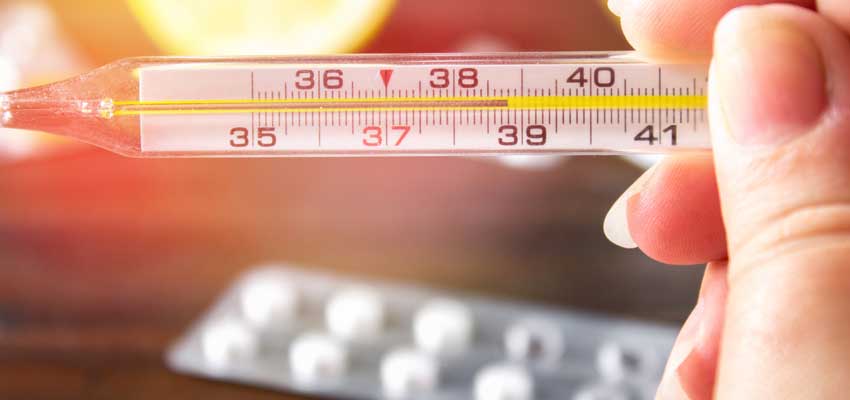Fever is a common symptom that occurs when our body is fighting an infection or an illness. It is characterized by an increase in body temperature above the normal range.
While fever can be uncomfortable and unpleasant, it is a natural response of our body to fight off infections.
However, it is important to treat fever to prevent it from causing further complications. In this blog post, we will be discussing the best fever medicine name list that can effectively help reduce fever and provide relief.
Understanding Fever and its Causes
Before we dive into the best fever medicine name list, it is important to understand what causes fever and how it affects our body.

Fever is generally caused by infections such as cold, flu, and other viral or bacterial infections. It can also be a symptom of underlying medical conditions such as autoimmune disorders, cancer, and certain medications.
When our body detects an infection or illness, it releases chemicals called pyrogens that signal the hypothalamus, a part of the brain responsible for regulating body temperature.
The hypothalamus responds by raising the body’s temperature to fight off the infection. This increase in temperature results in fever.
Also read about best tablets for loose motions in india here as well.
How to Check for Fever?
Before taking any fever medicine, it is important to confirm if you have a fever or not. You can check your body temperature using a thermometer.

There are different types of thermometers available in the market, including digital thermometers, ear thermometers, and forehead thermometers.
Consider reading about best headache tablets in india here as well.
Digital thermometers are the most commonly used type, and they are easy to use and provide accurate readings.
To check for fever using a digital thermometer, follow these steps:
- Wash your hands and the thermometer with soap and water.
- Turn on the thermometer and place the tip under your tongue.
- Close your mouth and wait for the thermometer to beep.
- Remove the thermometer and read the temperature on the display.
- A temperature of 100.4°F (38°C) or higher is considered a fever.
Over-the-Counter (OTC) Fever Medicines
Over-the-counter (OTC) fever medicines are available without a prescription and can be used to treat mild to moderate fever.

These medicines work by reducing the production of pyrogens, which helps to lower the body’s temperature.
Some of the best OTC fever medicines include:
Acetaminophen (Tylenol)
Acetaminophen is a common fever medicine that can be used to treat mild to moderate fever. It works by blocking the production of prostaglandins, which are responsible for causing fever and pain. Acetaminophen is available in different forms, including tablets, capsules, and liquid.
Ibuprofen (Advil, Motrin)
Ibuprofen is a nonsteroidal anti-inflammatory drug (NSAID) that can be used to reduce fever and relieve pain. It works by blocking the production of prostaglandins, which helps to lower the body’s temperature. Ibuprofen is available in different forms, including tablets, capsules, and liquid.
Here are easy steps to increase hemoglobin levels naturally for your reference.
Aspirin (Bayer, Bufferin)
Aspirin is an NSAID that can be used to reduce fever and relieve pain. It works by blocking the production of prostaglandins, which helps to lower the body’s temperature. Aspirin is available in tablet form.
Naproxen (Aleve)
Naproxen is an NSAID that can be used to reduce fever and relieve pain. It works by blocking the production of prostaglandins, which helps to lower the body’s temperature. Naproxen is available in different forms, including tablets and liquid.
Also read about levoflox 750 tablet uses here as well.
Prescription Fever Medicines
Prescription fever medicines are available only with a doctor’s prescription and are usually stronger than OTC fever medicines.

These medicines are often used to treat severe fever or fever associated with underlying medical conditions. Some of the best prescription fever medicines include:
Acetaminophen with Codeine (Tylenol with Codeine)
Acetaminophen with codeine is a prescription fever medicine that contains both acetaminophen and codeine. Codeine is a narcotic pain reliever that can help to reduce fever and relieve pain. This medicine is available in tablet form.
Ibuprofen with Hydrocodone (Vicoprofen)
Ibuprofen with hydrocodone is a prescription fever medicine that contains both ibuprofen and hydrocodone. Hydrocodone is a narcotic pain reliever that can help to reduce fever and relieve pain. This medicine is available in tablet form.
Consider Reading About:
Indomethacin (Indocin)
Indomethacin is a prescription NSAID that can be used to reduce fever and relieve pain. It works by blocking the production of prostaglandins, which helps to lower the body’s temperature. Indomethacin is available in capsule form.
Prednisone (Deltasone)
Prednisone is a prescription corticosteroid that can be used to reduce fever and inflammation. It works by reducing the immune system’s response to the infection, which helps to lower the body’s temperature. Prednisone is available in tablet form.
Natural Remedies for Fever
In addition to fever medicines, there are also natural remedies that can help to reduce fever and provide relief.
Some of the best natural remedies for fever include:
Drink plenty of fluids
Drinking plenty of fluids can help to keep the body hydrated and regulate body temperature. Water, herbal tea, and fruit juices are good options.
Take a lukewarm bath
Taking a lukewarm bath or sponge bath can help to lower the body’s temperature and provide relief.
Rest
Getting plenty of rest is important to help the body fight off the infection and reduce fever.
Use a cool compress
Applying a cool compress to the forehead, neck, and armpits can help to lower the body’s temperature and provide relief.
Also Read: Fiber Rich Foods in India
Precautions to Take When Using Fever Medicines
While fever medicines can be effective in reducing fever and providing relief, it is important to take certain precautions when using them. Some of the precautions include:
Follow the dosage instructions
Always follow the dosage instructions provided on the label or by your doctor. Taking too much of the medicine can cause serious side effects.
Avoid mixing different fever medicines
Avoid mixing different fever medicines, as this can increase the risk of side effects.
Check for allergies
Before taking any fever medicine, check if you are allergic to any of its ingredients.
Consult a doctor
If you have any underlying medical conditions or are taking any other medications, consult a doctor before taking any fever medicine.
Also read: Butter Fruit Health Benefits
Conclusion
Fever is a common symptom that can be uncomfortable and unpleasant. While fever is a natural response of our body to fight off infections, it is important to treat it to prevent it from causing further complications.
Over-the-counter (OTC) and prescription fever medicines can be effective in reducing fever and providing relief.
However, it is important to take certain precautions when using these medicines. In addition, there are also natural remedies that can help to reduce fever and provide relief.
It is important to check with a doctor before using any fever medicine and to follow the dosage instructions provided.
3 comments
is there any way to get rid of fever without any tablet in india? any home remedies?
The insights shared here have definitely helped me narrow down my options and make a more informed decision. Thank you for the valuable guidance and keep up the great blog.
Great Blog! It provides comprehensive information about fever medicines, including OTC and prescription options like Naproxen and natural remedies.